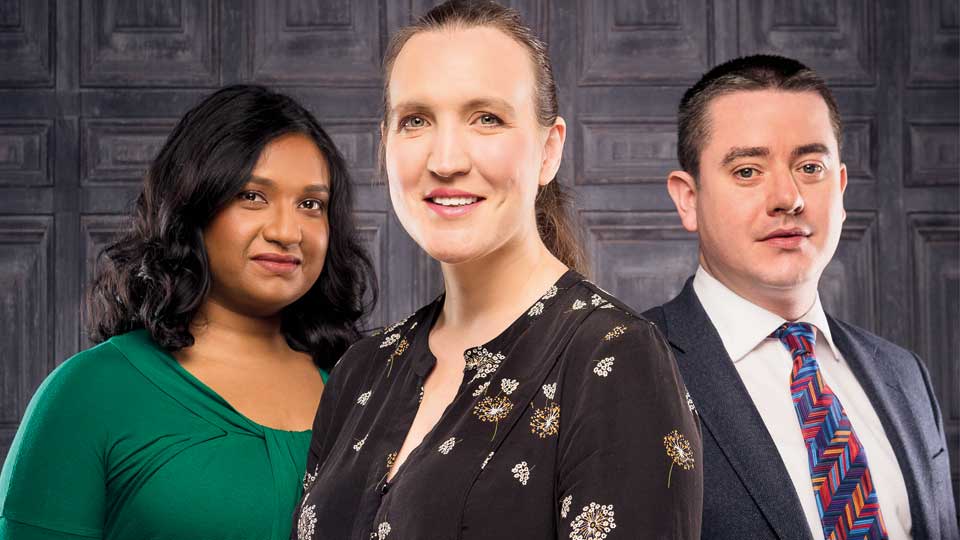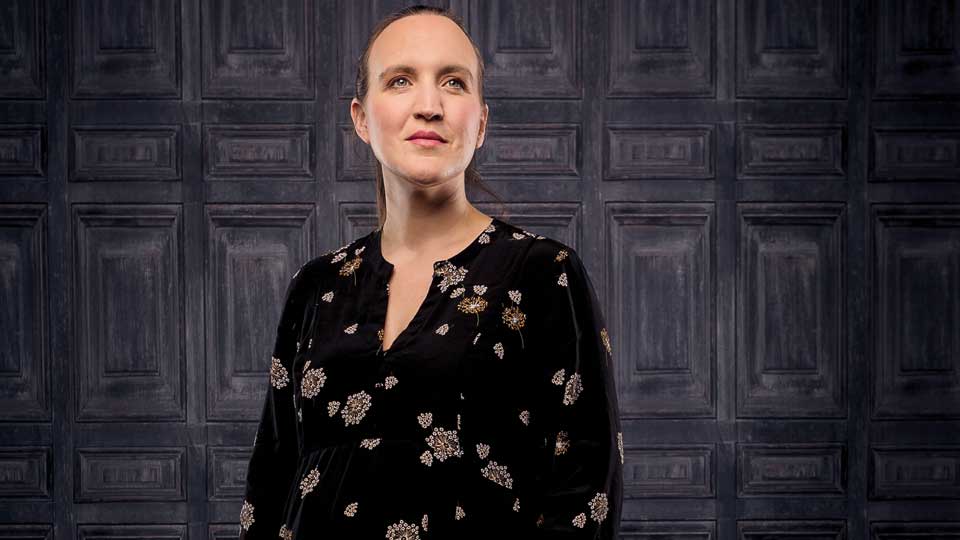- OT
- Professional support
- AOP
- In safe hands
In safe hands
In a continually evolving profession, the aim of the AOP legal and regulatory team remains constant – to protect and represent members. OT finds out how a streamlined structure and new recruits will enhance the team’s ability to support members

29 March 2019
Professional uncertainty can leave an optometrist feeling isolated and vulnerable. Whether it is a professional disciplinary matter, a clinical complaint or an employment conflict, it is a difficult path to navigate without the guidance of someone who has tread a similar journey many times before.
For AOP members, a freshly bolstered legal and regulatory team is on hand to provide timely and realistic advice.
Legal and regulatory director, Ella Franci, told OT that having a large team of in-house solicitors sets the AOP’s legal offering apart.
“You do become really familiar with the issues,” she shared.
AOP solicitors are able to provide practical guidance on navigating a legal or regulatory issue from the first call, with clinical colleagues on hand to provide expertise when needed.
Dealing regularly with optical professionals also gives the team an understanding of the mental impact that regulatory and legal proceedings can have on members.
“We are trying to make sure that as well as getting the right result we are also supporting the member,” she said.
Ms Franci emphasised that as an in-house team, there is a shared interest in the outcome of cases.
“We represent the profession. A good result for a member in front of the General Optical Council (GOC) is not only a good result for the individual member but also for the rest of our members, in terms of the point we are seeking to establish,” she explained.
The portfolio of strong results for members and in-house knowledge of cases is described by Ms Franci as “a real asset.”
Part of our role in protecting the profession is letting members know what practical steps they need to take to prevent them from becoming subject to a complaint
An enhanced service
Turning to changes within the legal and regulatory team, Ms Franci shared that the department has been split into four distinct work streams and additional staff have been hired to better meet member needs.
“First and foremost, we wanted people to have direct points of contact depending on their needs,” she shared.
“We've done that through streamlining the structure slightly, bringing in new resources and recruiting new people who bring fresh insight, energy and ideas to the team,” Ms Franci emphasised.
Optometrist, Henry Leonard, leads the clinical and regulatory team while three new recruits, Victoria Brooker, Debbie Nathan and Dejan Mladenovic head up clinical negligence, employment and professional discipline respectively.
When an AOP member calls the team for legal help, details of the enquiry and any relevant deadlines are recorded by a team member before it is given to Ms Franci for allocation into one of the work streams.
“My role is to make sure that it is sent to the right team at the outset, ensuring the member receives timely and appropriate advice,” she shared.
Ms Franci shared that a focus for 2019 is sharing lessons from legal and regulatory practice with the wider profession through a variety of avenues including regional seminars and case studies.
“Part of our role in protecting the profession is letting members know what practical steps they need to take to prevent them from becoming subject to a complaint,” she shared.
Her advice for members is to get in touch with the AOP sooner rather than later if they have something they need assistance with or something they are unsure of.
“There is no value in putting these things off. We are often speaking to members who just want to run something by us or touch base,” she shared.
“We are happy to answer those calls,” Ms Franci added.

Variety of work
When asked if there are trends in the type of work that the legal and regulatory department receives, Ms Franci emphasised that the variety of cases is part of what keeps her passionate about the role.
“After 12 years at the AOP, you think you have seen it all. But actually, you haven’t,” she said.
“Every clinical case is different and every enquiry we get has a different context to it,” Ms Franci added.
GOC work handled by the team can relate to clinical practice, conduct or the health of practitioners.
“I don’t think there is a clear front runner. The clinical cases are commonly failure to conduct appropriate investigations, failure to refer, failure to communicate effectively with patients and poor record keeping,” she shared.
Conduct cases may relate to personal misdemeanours while a student or more serious cases of fraud relating to the optometric business. There can also be issues of inappropriate conduct towards patients, Ms Franci highlighted.
NHS work often flows on from a GOC investigation or may include cases examining how a practice processes General Ophthalmic Service (GOS) claims and compliance with their GOS contract.
The team is now also providing advice to members on the duty of candour, which has recently been incorporated into the GOC Standards of Practice.
“It can be quite a difficult concept for people to grapple with, even professionals,” Ms Franci said.
The employment team fields a range of enquiries including locums unsure about their rights at work and their employment status and also contract queries and disputes.
Ms Franci shared that the most common clinical negligence claims relate to retinal detachments, tumours and glaucoma.
We are trying to make sure that as well as getting the right result we are also supporting the member
Personal rewards
For Ms Franci, it is the ability to help people that motivates her.
She added that a lawyer in private practice may not see a client again once the initial matter has been dealt with. However, in her job Ms Franci gets to know members and their families and still receives Christmas cards from practitioners that she has helped in the past.
“People put their lives on hold during these matters. You can really feel that,” she shared.
“When you do get a good result, it is extremely rewarding. When you see them at events afterward it is nice to see how they have come out the other end and positively moved on with life,” Ms Franci said.

Clinical and regulatory
Mr Leonard explained that his team provides clinical advice to the AOP’s legal team, to assist in defending members who are undergoing NHS, employment or GOC investigations.
“We also receive a wide range of clinical and regulatory enquiries from AOP members at all stages of their careers,” he added.
Sharing an example of the assistance the team has provided in the past, Mr Leonard highlighted the case of a member who got in touch after receiving notification that they were the subject of a GOC investigation.
The investigation related to an allegation that the practitioner had missed a retinal tear following a dilated examination.
Case examiners initially felt there was a realistic prospect that the member’s fitness to practise may be impaired and decided that the case should be considered by a fitness to practise committee.
However, Mr Leonard disagreed with the reasoning used by the case examiners and AOP solicitors recommended requesting a review of the decision through a ‘Rule 16’ application.
After the application was submitted, a new set of case examiners considered the matter and decided that all appropriate tests had been performed and the practitioner’s advice had been appropriate.
“They decided there was no realistic prospect of establishing that our member’s fitness to practise was impaired, and concluded that no further action was necessary,” Mr Leonard highlighted.
“In this case, making a ‘Rule 16’ application allowed us to bring the matter to a swift conclusion, and avoided the need for a prolonged GOC investigation, much to the relief of our member,” he concluded.

Employment
Ms Nathan shared that as well as providing advice to employees, around one in four enquiries that come to her team are from employer members.
Queries from employers often relate to developing workplace policies and the implications from the sale of a practice.
Ms Nathan highlighted that the AOP has template contracts for employees and locums on the website.
Illustrating the diverse range of support provided by the AOP, Ms Nathan described the assistance provided to a member who needed to move to part-time hours for childcare reasons.
The member was due to return to work after a period of maternity leave and had tried to discuss flexible working with managers in her store.
Unfortunately, she received conflicting messages from her employer. She then contacted the AOP’s employment law team.
The AOP provided the member with advice around her legal rights and the process that employers should follow when considering flexible working requests.
“We were able to advise the member on what employers should consider when they are deciding whether or not they can agree to a flexible working request and she found this reassuring,” Ms Nathan said.
It definitely puts members in a stronger position
The AOP helped the member to submit a formal flexible working request and advised her throughout the process. Following the first formal meeting the member was not happy with her employer’s decision to refuse her flexible working request and the AOP provided advice on the appeal process and again assisted the member in drafting a detailed letter of appeal.
Following an appeal hearing, the employer reviewed their decision and agreed that, with some changes, the working pattern that the member had suggested was reasonable and could be accommodated.
The member found that clear advice on her legal rights, coupled with support throughout the process, helped her reach a fair compromise with her employer.
“It definitely puts members in a stronger position,” Ms Nathan emphasised.
Clinical negligence
Prescription errors, retinal detachments, glaucoma, and tumour cases are the four of the most common areas that the AOP’s clinical negligence legal team provides support on.
The clinical negligence legal team run claims on behalf of members through both the pre-litigation and litigation stages.
They support members who have been asked to provide a statement to their employer and assist optometry practices drafting responses to patient complaints.
The clinical negligence legal team also manages member’s cases through litigation from initial receipt of the claimant’s claim form through to the trial. Members are involved throughout the process with their defence, witness statement, attendance at expert meetings and in preparation for and attendance at the final hearing.
Ms Brooker shared a recent example relating to a claim that a member had failed to diagnose a retinal detachment leading to a full macular off retinal detachment.
“There had been no indication that the claimant needed to be dilated at the examination. We successfully defended the claim against the claimant and persuaded them to discontinue their claim in the light of our supportive independent expert evidence,” she said.

Professional discipline
Sharing a recent case from the professional discipline team, Mr Mladenovic highlighted a situation where the GOC alleged that a member had failed to spot obvious signs of a tumour at the back of a patient’s eye.
He said the GOC decided that the member posed a risk to public protection and applied for an interim order that would have restricted the member’s ability to practise for 18 months while an investigation took its course.
“On the face of it, the allegations were serious,” Mr Mladenovic said.
“However, through the evidence we put before the committee at the hearing, we were able to show the committee that the tumour was far harder to detect than was suggested by the GOC papers,” he explained.
The fitness to practise committee agreed and decided not to impose an interim order on the member, Mr Mladenovic highlighted.
Image credit: Will Amlot
Advertisement


Comments (0)
You must be logged in to join the discussion. Log in